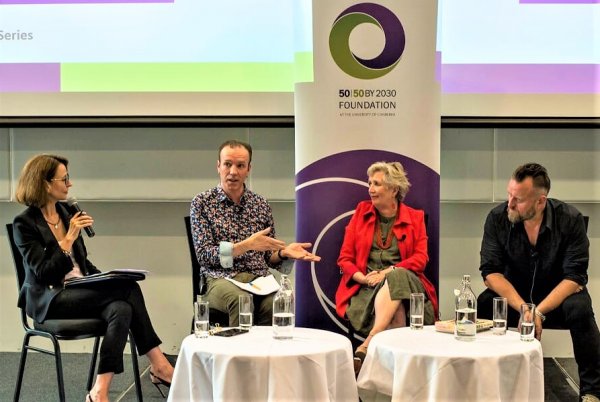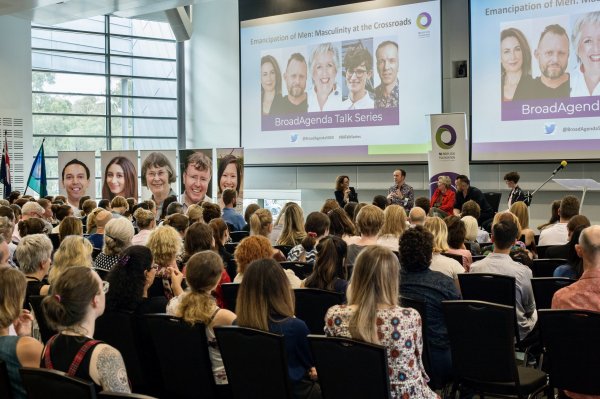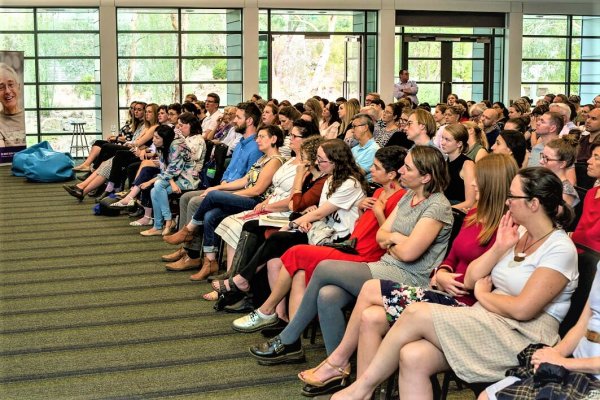Like a great many four-year olds, Jane Caro’s grandchild Alfie likes to play dress ups. Nothing odd in that. Alfie’s movie character of choice, just like thousands of preschoolers across Australia is not Batman or Spiderman but Elsa the heroine from the Pixar mega-hit Frozen.
This is unremarkable. In fact, it would go wholly unnoticed in the broader Caro clan except for the reactions of other people who find Alfie’s hero of choice odd and alarming, with obvious moral concern for his future adult self.
There’s a shame that’s piled on a four year old boy who likes dressing up as Elsa”.
Speaking at the sell out BroadAgenda Public Talk Series panel at the University of Canberra last night, Ms Caro said “there’s a shame that’s piled on a four year old boy who likes dressing up as Elsa”.
“If a boy wants to play with dolls, it’s not okay. Girls can play with whatever they want, in fact there is admiration if she chooses trucks over dolls. But with boys, there is a shame attached to it.”
Ideas of masculinity and expressions of it is a hotly contested issue in 2020, as the hour-long panel discussion found. Along with Ms Caro, a public intellectual and writer, the panel featured academics Michael Flood; gender scholar Elise Stephenson, and journalist and writer Phil Barker. As the audience heard little about masculinity in an era of #MeToo, gender equality and fourth-wave feminism is simple.
Indeed, Alfie’s case encapsulates in many way the broader tension around social expectations of how men express themselves.
As Dr Flood pointed out: “The reason there is shame for a boy [to dress up as a feminine character] is that he is attracted to something that is [seen as] subordinate. Whereas a girl who plays with boy’s toys is seen to be reaching up for something that is privileged.”
Expectations to conform to norms of masculinity are having a dreadful and damaging impact on the lives of men – in terms of their health, their relationships and their self-esteem.
Expressions of masculinity was the topic of Barker’s book The Revolution of Man published in 2019. As he told the audience, expectations to conform to norms of masculinity are having a dreadful and damaging impact on the lives of men – in terms of their health, their relationships and their self-esteem. But they struggle on because it’s better than being called “a pussy or, worse, gay”.
“Trying to be a man, has ruined or broken many people,” Mr Barker said. “In the future we can only hope that people are judged on what they contribute to society, not only what gender they are. Men need emancipation from … the idea of masculinity itself.”
However, concepts of masculinity are not fixed and have changed dramatically over time. As Ms Stephenson pointed out: “Ideas of masculinity in 16th century France are very different to ideas of masculinity in Ipswich in Brisbane in 2020.”

 “Certainly, masculinity in the modern era is wrapped up in notions of dominance, stoicism and oppression”, Dr Flood said.
“Certainly, masculinity in the modern era is wrapped up in notions of dominance, stoicism and oppression”, Dr Flood said.
“But there is no doubt these models of what it means to be a man constrain men’s lives. The big problem is the way these forms of masculinity are part of systematic gender inequality.
“Absolutely men get fucked over by masculinity, but men are not as oppressed by their masculinity as women are by it.”
Has the #MeToo movement been a gift to masculinity or a major blow?
The question hanging in the air for much of the evening was the impact of #MeToo on men and the women around them. “Has the #MeToo movement been a gift to masculinity or a major blow?” asked Ms Haussegger.
The answer is mixed. While many men, now understand the rules of engagement with women more clearly and are more likely to believe women when they make accusations of sexual harassment or assault, the flipside has been a vigorous push back, said Dr Flood.
 “Some men think women lie and make false allegations and that harassment accusations have increased in Australia – even though it is absolutely untrue that false allegations are common,” Dr Flood said
“Some men think women lie and make false allegations and that harassment accusations have increased in Australia – even though it is absolutely untrue that false allegations are common,” Dr Flood said
“Over all, #MeToo has been very productive in giving space to victims and survivors, increasing the credibility that we give to their voices and maybe in shifting slightly the norms of sexuality and gender that may feed too often into behaviours of harassment.
“Ultimately, resistance is a sign there is change.”




